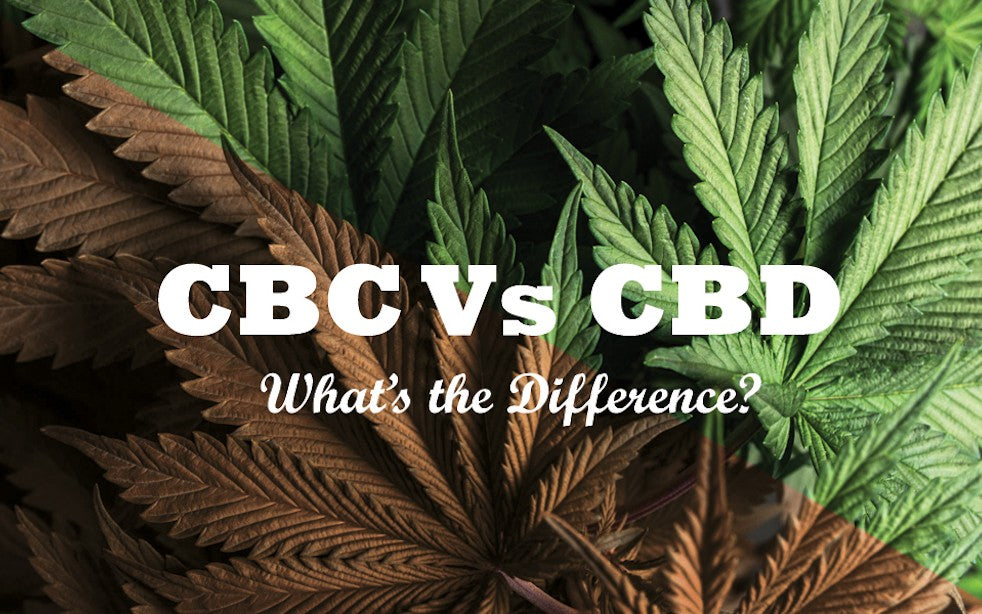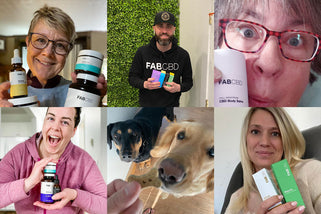
CBC vs CBD: What’s the Difference?
Whether you’re new to CBD or have been using it for years, chances are you’ve probably heard of the two main cannabinoids that are found within the cannabis plant: CBD and THC. What many people have not heard of, however, are other cannabinoids like CBC that scientists are just now beginning to study. In order to better understand CBC, it helps if we compare CBD and CBC side by side.
What is CBC?

CBC, or cannabichromene, is one of over 100 other cannabinoids found in the hemp and marijuana plant. While potentially evoking a range of effects when taken, its main function is to work in conjunction with the body’s endocannabinoid system, or ECS. Interestingly, CBC is extracted from the stem cell of the cannabis plant, and not from the flower.
For those who are unfamiliar with the ECS, this system contains many receptors that these cannabinoids bind to. The most notable ones are the CB1 and CB2 receptors in the brain and immune cells. CBC, however, does not bind to the CB1 or CB2 receptors. Instead, it binds to other receptors in the body. At its core, the ECS is responsible for helping the body get back to, and stay in, a state of balance. And CBC plays a part in that because it works synergistically with other cannabinoids to evoke an entourage effect while it's working with the body’s ECS.
During the entourage effect, the cannabinoids boost up each other’s positive effects while dampening their less desirable ones. Therefore, your endocannabinoid system should be getting the very best out of each cannabinoid that works with it. So while it may be difficult to find a CBC isolate product, you’ll have an easier time simply buying a high-quality full-spectrum or broad spectrum CBD product that contains other cannabinoids like CBC.
What is CBD?

As we said earlier, CBD is one of the main cannabinoids in the cannabis plant. While THC can cause people to feel “high” when taken in large quantities, CBD does not. And unlike CBC, CBD isolate products are pretty easy to find, although full- and broad spectrum CBD products tend to be more popular. CBD also works with the body’s ECS. In fact, it helps to stimulate the CB1 and CB2 receptors even though it might not bind directly to them.
People use CBD products for a lot of different reasons, but just like with any other natural supplement, you still have to do your homework to make sure you’re buying yourself the highest quality CBD product from a trusted and respected brand.
Similarities of CBC and CBD
There are more similarities between CBD and CBC than there are differences. They are both extracts of the hemp plant. They both interact with the receptors in the body and the endocannabinoid system. So they come from the same plant and they both hang around the same basic mechanisms in the body. But how these two cannabinoids differ is what brings out their respective values.
Differences Between CBC and CBD
The main difference between CBC and CBD is in the way that the two cannabinoids interact with the receptors in the ECS. CBC binds to the TRPV1 and TRPA1 receptors, or transient receptor potential vanilloid 1 and transient receptor potential ankyrin 1 receptors, in the nervous system, while CBD mainly interacts more with the 5-HT1A receptors.
Another big difference is that while CBD products are more common and easier to find, it’s more difficult to find CBC isolate products. So, instead of spending your time searching endlessly for CBC products, your best bet is to buy a top-quality full-or broad spectrum CBD product that also contains CBC and other cannabinoids, phytonutrients, and terpenes.
Related Article: CBD vs CBG: What’s the Difference?
Endocannabinoid System: CBD and CBC Interactions
For those who are unfamiliar with the ECS, this system contains many receptors that these cannabinoids bind to. The most notable ones are the CB1 and CB2 receptors in the brain and immune cells. CBC, however, does not bind to the CB1 or CB2 receptors. Instead, it binds to other receptors in the body. At its core, the ECS is responsible for helping the body get back to, and stay in, a state of balance. And CBC plays a part in that because it works synergistically with other cannabinoids to evoke an entourage effect while it's working with the body’s ECS.
During the entourage effect, the cannabinoids boost up each other’s positive effects while dampening their less desirable ones. Therefore, your endocannabinoid system should be getting the very best out of each cannabinoid that works with it. So while it may be difficult to find a CBC isolate product, you’ll have an easier time simply buying a high-quality full-spectrum or broad spectrum CBD product that contains other cannabinoids like CBC.
CBD vs CBC: Which is Better?

When it comes to figuring out whether CBD is better than CBC, it’s best to look at the whole picture. For example, even though some people really enjoy taking CBD isolate products, they’re not getting all of the other amazing cannabinoids, terpenes, and phytonutrients that the hemp plant has to offer through full- and broad spectrum products.
Because isolate products don’t contain any other cannabinoids, there’s no chance that an entourage effect can happen. There will also be less overall interaction with the body’s endocannabinoid system. But at the end of the day, it all comes down to preference. Everyone needs to choose the type of products that work best for their needs and goals.
As we said before, CBC isolate products are kind of hard to find. So it’s better if you choose a high-quality full or broad spectrum CBD product that contains a wealth of other cannabinoids, including CBC. This way, not only will you be able to take advantage of what the CBC has to offer, but you can also enjoy the effects from a host of other cannabinoids as well. Additionally, CBD products are considerably less expensive when compared to specific CBC products. The reason for this is the process that it takes to create CBC products tends to be more involved as well as more costly in the long-run.
Endocannabinoid System: CBD and CBC Interactions
Every human and animal has an endocannabinoid system. The ECS is made up of many different types of receptors, but the most notable ones are the CB1 and CB2 receptors. These receptors are found in different areas of the body.
For example, CB1 receptors are located in:
- Spinal cord
- White blood cells
- Nerve cells in the brain
- Spleen
- Urinary tract
- Gastrointestinal tract
- Endocrine glands
CB2 receptors are found in:
- Tonsils
- Spleen
- White blood cells
- Immune cells
To quickly recap: CBC binds best with the body’s TRPV1 and TRPA1 receptors, while CBD interacts mostly with the 5-HT1A and CB1 and CB2 receptors. Both cannabinoids help to evoke different effects within the body, which ultimately helps the endocannabinoid system bring the body back into a state of balance.
Summary on CBC and CBD

Not much is known about CBC as is known about CBD. So even though it’s exciting to learn more about these lesser-known cannabinoids, you shouldn’t go about excluding all of the other amazing parts of the hemp plant by searching for CBC isolate products.
Remember, each cannabinoid is unique and effective in its own way. Therefore, you’re better off incorporating a top-notch full- or broad spectrum CBD product into your daily routine over CBC isolate products.
Moreover, there’s so much to learn about the cannabis plant in general that it can be downright overwhelming. The good news is that there’s no rush. So while you’re enjoying whatever variety of CBD product you’ve chosen, you can spend as much time as you want learning as much as you can about the different cannabinoids in the hemp and marijuana plant. And along with broadening your knowledge, the research you do will also help you to select a top-quality product that best suits your own unique goals and needs.
















